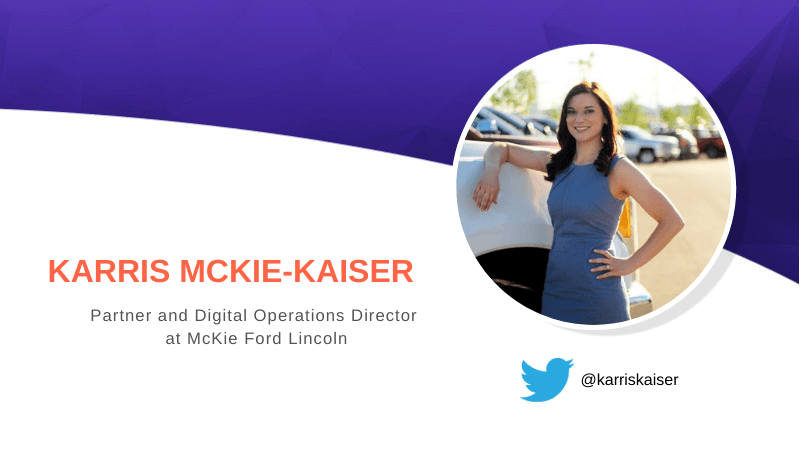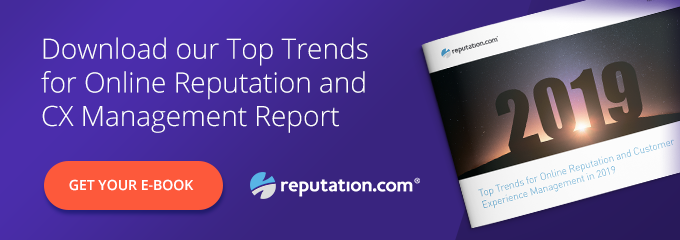Q&A with Karris McKie-Kaiser: Millennial Leader at Ford Dealership Dynasty
Reputation Staff Writer


Karris McKie-Kaiser is a partner and digital operations director at McKie Ford Lincoln of Rapid City, South Dakota, a business her family has owned for 40 years. The dealership recently appeared in the top 10 for customer service in Reputation.com’s 2019 Automotive Reputation Report, which analyzed 16,000 dealerships across the country. Find out how McKie-Kaiser keeps her family business on top of the industry.
Your family has run your dealership for 40 years. What marketing and customer service strategies have you seen work well for your company over this time, and what new approaches have you taken?
We’ve always been consistent with our strategies. That doesn’t mean we use the same ones now that we did 40 years ago — we keep what works and tweak it, or sometimes we employ completely different strategies, but our vision has been consistent.
We’ve also implemented so much more technology and data into our business processes. Our dealership management strategy is very data-driven, and we use the latest and greatest tools to help manage our business decisions.
But the bedrock of every thriving, longstanding business is good customer service. Good customer service will always be important, no matter what business you’re in. If you treat your customers professionally and are fair to all parties involved, customers will respect that, and they’ll enjoy bringing their vehicle in to get serviced or purchasing a vehicle from you.
Has digital marketing and social media been a game-changer for how you advertise?
Other dealerships still use a lot of traditional TV, radio and print. But we made the commitment at the beginning of 2018 to go all digital. That’s helped us succeed on the sales side, and on the service side as well.
We’ve thrown our advertising dollars into paid searches and social media marketing — especially Facebook, Instagram and digital TV. You may still see a lot of local TV commercials featuring other local franchise dealerships, but we let the manufacturer take that over.
Was it hard to convince the old guard to make the change?
Even though I’m a millennial, I needed the most convincing! When the general sales manager and the dealer and myself came to the agreement, it was me who was holding everything up. A lot of that was me not wanting to stop doing what we’ve always done, what had always worked for us. They were the ones talking me into it, which is kind of funny!
But we said, you know, we’re dumping a lot of money into something (advertising in traditional media) and we don’t know if it’s working. It may or may not be reaching the specific in-market customers we’re looking for. There were so many unknowns, and we’re so data-driven now. That’s how we make our decisions — we go by the data.
You were recently included in the top 10 for customer service in the country, beating out almost 16,000 other dealerships. What’s your secret?
Specifically, we have a committee of 12-15 people who meet every month — our Voice of the Customer committee. We’ve had that committee for 15 years. It includes department manager heads, parts and service, the general sales manager, me, front-line employees like service advisors and sales consultants, and our HR director. Plus, our receptionist greets the customers who come to our showroom, and she takes 99% of the incoming phone calls.
That group’s main focus is looking at manufacturer survey results and customer comments. We also go over all the online reviews we received for that month. I send the good ones that mention a specific person to them, to give kudos. We talk about the bad stuff too — process changes that need to happen, or feedback for department managers.
Not all businesses welcome employees bringing up negative experiences, unhappy customers, etc. But you encourage it?
I wouldn’t say we reward employees for bringing up customer service issues, but we work to make it so it’s a learning experience for everybody. If we don’t know about a problem, we can’t correct it.
Everybody knows that if they’ve got an upset customer and they don’t know what to do, they can always come to me.
How do you deal with unhappy customers online, especially if you feel their review is unfair?
We state the facts. Sometimes the fact is that one of our employees screwed up and we’re apologetic about that and willing to admit it. Sometimes it’s about letting the public know that maybe the customer used abusive language, which is something that nobody should ever tolerate.
We get it — emotions run high when your car has broken down and we can’t get you in for two weeks. You’re going to go to the ceiling. So we try to defuse those situations and handle them calmly.
I see that you post responses to all your reviews — good and bad — within hours of them going up.
It’s my personal responsibility to respond to each and every review, good or bad. I give all the positive reviews and ratings a personal response. I send negative reviews to the department manager or specific employee and the dealer. Then the managers research it and follow up directly with the customer or with me, and then I write a personal response to that poor review.
It sounds like a lot of work.
One tool I love is the review aggregator Reputation.com has as part of its partnership with FordDirect. Their software crawls online directories and review sources, and they email the reviews directly to my inbox. They make it super easy, saving me the time of having to look at all the different review sites every day.
Has the dawn of the online review changed how you do business?
Some dealers think of online reviews as a curse or a negative thing because people can really post anything. But we look at it as an opportunity to show how good we are. We know that we always treat our customers right, but now we have other people saying it.
What could be better than your customers telling you how great their experience was at your dealership? Hopefully that attracts other customers.
Do car dealerships have to work harder at preserving and bolstering their reputations because of the public perception that they are less honest than other industries?
We do, and I hate to admit that. It’s because of our predecessors. But it’s a different time now. Car dealers weren’t doing great things in the past, so we’ve had to work hard at being transparent and consistent with our processes.
And to be fair, I don’t think we in the car dealership industry understood how unhappy some customers were. Back in the days when you had to call or write a letter of complaint, customers would rarely bother. Now it’s easy to leave a bad review. When you get one, it forces you to look at your processes and see what you need to fix.
There are so many dealerships out there, many owned by large, national corporations. How do you set yourselves apart and carve out your niche?
We stress in all our marketing and advertising — and directly to our customers, as well — that our dealership is family-owned and operated. We’re not part of a larger group. We’re all active members of the community, and we do everything to make sure people know they’re dealing with a local family, just like their own family.
Do you work to incorporate this element into social media posts?
I’m the de facto spokesperson for the dealership; I appear in all the commercials, and I’m kind of the face of the business. So that helps people relate our business to someone they see in the community. But we also feature employees. They’re members of the community, as well, and that’s a huge factor. People see our employees as their friends and neighbors in the community.
Would you like to learn more about customer experience management trends and your online reputation? Reputation.com invites you to download our “Top Trends for Online Reputation and CX Management Report.”


